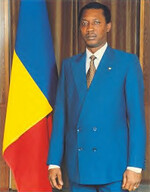
President Idriss Deby of Chad will allow Chevron to remain in the country after a dispute was resolved over taxes. Chad recently signed an agreement with Sudan.
Originally uploaded by panafnewswire
The children have been temporarily placed in a Chadian orphanage
Six French nationals held in Chad over an alleged attempt to fly 103 children out of the country have gone on hunger strike, a judicial source says.
The six members of the Zoe's Ark charity began the strike because of concerns over how the legal process was conducted, the source said.
They also feel they have been let down by the French government.
The charity workers are being held in Chad's capital, N'Djamena, on charges of kidnapping and fraud.
"They have been on hunger strike since last night (Friday)," the legal source told the BBC's Stephanie Hancock, adding that they were refusing food but were drinking water.
The source also said that the trial of the charity workers would start in the coming weeks in Chad - this has not been confirmed by N'Djamena.
Meanwhile, a lawyer for the detained workers said in France he was optimistic that French President Nicolas Sarkozy would intervene on their behalf, the AFP news agency reported.
Last month, Mr Sarkozy flew to Chad to discuss the case with Chadian officials, and N'Djamena later released 11 European nationals who had been arrested together with the six French workers.
'Inhumane' operation
The Zoe's Ark members were arrested in October for what Chadian officials say was an illegal attempt to fly 103 children, aged one to 10, to France.
Zoe's Ark has said it thought the children were orphans from the conflict-torn region of Darfur in neighbouring Sudan.
Stephanie Lefebvre, secretary-general of Zoe's Ark, has insisted the charity was acting out of compassion.
But international humanitarian organisations have said that almost all the children were from Chadian villages in the border area, and have at least one parent or adult guardian, according to the AFP news agency.
Chadian President Idriss Deby has described the operation as "inhumane" and "unacceptable" and said those responsible would be "severely punished".
Money
French government sources told the BBC that some 300 families in Europe may have paid a total of up to 1m euros ($1.4m) to charities in the hope of being able to adopt one of the children arriving from Chad.
Most of these families were French, and the remainder Belgian.
The UN children's agency, Unicef, said the operation "took place in violation of international rules".
In August, the French authorities issued a warning about the activities of Zoe's Ark, saying there was no guarantee that the children whom the group wanted to transport were actually orphans.
CHAD: European force "blocked" for now
A European force meant to protect aid workers and hundreds of thousands of refugees and displaced people in eastern Chad is on hold
NDJAMENA, 5 December 2007 (IRIN) - The 4,500-strong European force expected to start arriving in Chad and the Central African Republic in November to protect aid workers and some 500,000 displaced civilians is on hold for now. The force, known as EUFOR, currently consists of 23 military personnel holed up in a hotel in Chad's capital N'djamena, 700 km west of the conflict zone.
"The process [of launching the force] has been blocked for the moment," EUFOR spokesman Lieutenant Colonel Patrick Poulain told IRIN on 4 December. "EU countries have not agreed on who should provide the equipment we need to get started and they are no longer even having what we call 'force-generating' conferences to discuss the matter," he said.
"Things must first be worked out at the highest [presidential and ministerial] level before we can have another force-generating conference to discuss how to get the force up and running," he said, adding that even if next week EU countries were to agree on providing the necessary equipment the force could not properly launch before January.
In the meantime conditions in the east have deteriorated markedly in the past week with heavy clashes between the Chadian army and rebel groups that have left an estimated 1,000 combatants dead or wounded.
Banditry is also on the increase, including attacks on aid workers. The latest occurred on 3 December on a UN World Food Programme convoy travelling to the refugee camp at Breidjing.
For EUFOR to get started it needs airplanes, helicopters and a field hospital, Poulain said. "These are expensive assets that no country so far has been willing to give."
EUFOR has yet to begin building its bases in the east. "Even the precise locations have not even been decided," he said. "It will partly depend on where we can find bore water."
The plan is for the bases to be near areas where large populations of Sudanese refugees and displaced Chadians are camped, he said, adding, "though we know the bases will remain on the periphery."
Policing of the sites will be the job of a new UN Mission for the Central African Republic and Chad known as MINURCAT. But the mission, which will consist of only police and unarmed military observers, also has yet to begin operating as EUFOR is to protect it.
Currently the 23 EUFOR personnel in N'djamena depend on a French force based in Chad for decades codenamed
'Epervier'. "We currently have to use Epervier transport to travel to the east," Poulain said. "We even have to go to their base for meals."
The French force under a cooperation agreement provides support to the Chadian military, while the mandate of EUFOR is to remain strictly neutral.
Poulain said that as soon as EU countries agree on who will provide the equipment the force needs, ground troops from Epervier will be put under the command of EUFOR. "That will speed up the launch," he said.
Report can be found online at:
http://www.irnnews.org/Report.aspx?ReportId=75700
No comments:
Post a Comment